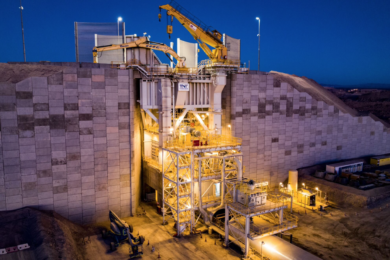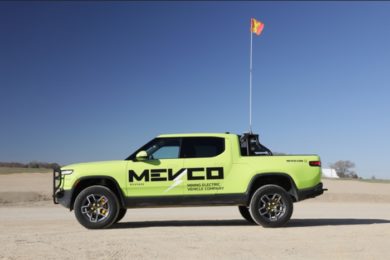Back in August 2021, work began on Alcoa Brasil’s Filtro Prensa project at its Poços de Caldas alumina refinery, which is supplied by a captive nearby bauxite mine. It represents an investment of R$310 million (US$55 million) that will completely change the technology for disposing of waste at the operation in Minas Gerais. The works were expected to take 15 months, employing around 500 workers at the peak, and the opening is scheduled this year for November 2022.
The project required nearly seven years of studies. A new bauxite residue filtration facility will transform how the refinery manages bauxite residue – a byproduct of the alumina refining process that is primarily made up of red mud and coarse sand. The coarse sand fraction (red sand) comprises approximately 40% of residue and approximately 60% of fine silt fraction (red mud).
It will generate a dry residue, with only 30% moisture, equivalent to the natural soil moisture, and directs the water removed to the production process, through a closed circuit, to be reused. The dry waste will be transported in trucks and unloaded in a new waste disposal area, where it will be compacted. This is the third Alcoa unit to implement this technology – the other two were in Australia – and the first in Brazil. The process allows for huge water volume savings as the water can now be recycled in a closed-loop system.
The filter press technology is being supplied by Diemme Filtration based in Lugo, Italy, which is part of Aqseptence Group. Filtro Prensa will use two overhead beam GHT2500P filter presses with customised characteristics for Alcoa (such as valves, electricals and components). They have 100 plates each but are expandable to 130. Diemme also supplied similar filter presses for two of Alcoa’s Australian alumina refinery sites which are in Kwinana and Pinjarra, both in Western Australia. Alcoa was the first major alumina producer in Australia to use residue filtration.
Filter press technology has advantages that make it particularly suitable for bauxite residue treatment. Compared to other technologies, filter presses allow drier residue (with residual moisture lower than 30% w/w). As a consequence, the material handling characteristics of the cake obtained by using filter presses Diemme argues are far better than results achieved by alternative methods.
In Brazil, Alcoa has three production units, in Poços de Caldas (MG), São Luís (MA) and Juruti (PA), as well as offices in São Paulo (SP), Poços de Caldas (MG) and Brasília (DF), in addition to a significant shareholding in bauxite miner Mineração Rio do Norte (MRN) and in four hydroelectric plants: Machadinho, Barra Grande, Serra do Facão and Estreito.
“Re-defining what it means to be the most sustainable upstream aluminum company requires a deep commitment to continuously improving our footprint and a relentless pursuit of innovation that will help us progress,” said John Slaven, Alcoa Executive Vice President and Chief Operations Officer last year. “By continuing to roll out this bauxite residue filtration technology across more of our refineries, we continue to set new benchmarks in regard to resource management while making progress on goals aligned with our Advance Sustainably strategic priority.”










